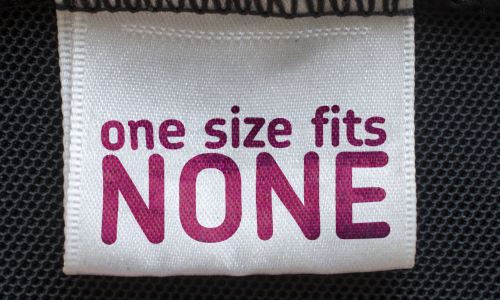Organisations have long held tight to standardised Employee Value Propositions (EVPs) – delivering a consistent, equitable and (hopefully) appealing experience of work.
But this is no longer enough. Long live the personalised EVP.
Against the backdrop of the Great Resignation, organisations are grappling with how to differentiate their Employee Value Proposition and discovering that competition isn’t only coming from what other businesses can offer, but from other levers of value that individuals are now prepared to prioritise above conventional work and remuneration.
Hybrid and remote-first opportunities, along with inflated salaries, are perhaps the most common incentives being thrown on the pile employee inducements. While the majority of employees now say they expect much greater flexibility from their work, most businesses are yet to gain a deep appreciation of what that flexibility really means for the individual in terms of freedom, autonomy and wellbeing.
Reflecting on her own pandemic experience, Peta Karunaratne, Founder & CEO of The Karuna Collective notes: “Mornings have become invaluable to me; without an hour’s commute to a city office, I can walk the dog, have breakfast with my husband, and start generating ideas for the work ahead. What would I gain by going into an office that I would value above these things?”
“This is the conversation leaders need to be having with their people. This is what your EVP is competing with. It’s time for the personalised employee value proposition,” says Peta.
Flexibility v radical adaptability
Though much remains uncertain about the Future of Work one outcome of is clear: one size does not fit all.
Organisations have long held tight to standardised EVPs based on delivering a consistent, equitable and (hopefully) appealing experience of work: same desk, same access to technology tools, same work hours, same gym-pass, same Friday Drinks incentives and even the same access to flexible work.
But universal ‘Email Free Fridays’, or ‘Work from Home Tuesdays’ are not the kind of freedom that many of us have come to value over the past two-years: “Flexibility isn’t merely about working from home one to two days per week,” says Peta.
In the likely hybrid or remote-first work future, consistency of experience is not achievable, if it ever was: “Everyone consumes and values experiences differently,” says Peta:
“Equity will come from giving people access to same opportunities for radical adaptability – not merely providing people with another form of standardised flexibility.”
Of the flexibility and hybrid work policies being madly drawn up by HR Departments, Peta says: “Organisations don’t need another HR policy that needs to be policed. They need Principles of Trust that everyone agrees to and allows for personalised expression of your EVP.”
Anchoring work design in this kind of empathy and personalisation, Peta believes individuals will be enabled to create their best, most productive and fulfilling work patterns, and deliver better outcomes and greater impact for the business.
Hybrid – more than location, location
The opportunity to do hybrid or remote-first work is being held up as the centrepiece of many refreshed, post-COVID EVPs.
And while the opportunity for location-based flexibility is fast becoming a threshold consideration for candidates, Peta cautions: “Those organisations that see hybrid work as merely a matter of location, miss out on enormous potential for crafting a truly compelling EVP and risk costly fatigue and burnout.”
Peta recommends organisations not only consider the ‘where’ of flexibility, but think too about the ‘when’:
“Can you provide pockets of flexibility in your team’s day to give them control over work patterns?”
One impacts of the shift to hybrid is likely to be on culture; with less time collocated, there is less time for employees to passively observe behaviours. For those who are new to the organisation or new to the workforce, this could be particularly challenging, given that behaviours are the basis of an organisation’s culture.
“We need to get better at defining and being intentional about how we create culture through rituals, communications and deliberate exposure to synchronous work,” says Peta, adding: “And that culture will need to support more personalised, more human experiences.”
Empathetic leadership
The role of the leader has been redefined by COVID.
In the immediate term, leaders need to be having conversations with their people about what they as an individual value and need, and then look to find ways to adapt and accommodate that within the work of the team.
Over the longer term, and with visibility more difficult to establish in the likely hybrid context ahead, leaders will also need to adapt to measuring performance by outputs and impact, rather than daily monitoring of inputs.
The challenge is generational: “We’ve spent decades developing managers to lead teams in a co-located environment, but now we’re asking them to do this in a distributed, virtual context,” says Peta.
This requires a wholly different skills set in which leaders need to become skilled at having vulnerable conversations, leading with curiosity, and responding with deep listening and empathy.
“As a leader, your role now is to help individuals uncover and move towards their goals through the work of the team, in a model of work that sets them up to thrive,” says Peta.
Download The Karuna Collective’s free Development Discussion Guide for more impactful career conversations.
Putting humans at the centre of your Employee Value Proposition
Organisations that fail to re-evaluate their EVP, will not only struggle to attract top talent, but risk losing existing people.
At the C-level, Peta believes communication and transparency is key to reducing unnecessary turnover and creating a compelling value proposition: “As an enterprise, acknowledge that you are learning and responding to the evolving situation over time. Be prepared to experiment and avoid the temptation to make big, hasty decisions.”
Organisations that lead with empathy and can craft new ways of working around human behaviours, will naturally arrive at a compelling EVP and see greater impact and better outcomes in the future.
“Anchor your employee value proposition in flexibility and empathy and measure your people’s performance in terms of output and impact, says Peta, “This is what will drive productivity and engagement and may be the real motivation for employees to join your organisation.”
If you’re grappling with how to design more human-centric, personalised value propositions, reach out here.






